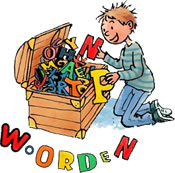
I came across an interesting Dutch word today – Woordenschat [ˈʋoːɾdəsxɑt] – which means vocabulary. Woorden = words and schat = treasure, and also love honey, darling, sweetheart. So woordenschat is a “treasure of words” or “word treasure”. It reminds me of the English expression wordhoard, an alternative term for vocabulary, from the Old English wordhord.
Are there similarly interesting terms for vocabulary in other languages?
Woord also appears in such expressions as:
– woordafbreking = hyphenation (“word breaking/splitting/dividing”)
– woordelijk = verbatim, literal, word-for-word (“word like”)
– woordenboek = dictionary (“word book”)
– woordenlijst = glossary, word-list (“word list”)
– woordenrijk = verboose, volubly (“word rich”)
– woordenstroom = verbiage (“word flow”)
– woordenwisseling = altercation (“word exchange”)
– woordenzifter = nitpicker, niggler, hair-splitter (“word sifter”)
Schat also appears in such expressions as:
– schatje = baby, honey, sweetheart
– schatkist = treasure chest
– schatmeester = treasurer
– schatrijk = immensely rich
I don’t like to be a woordenzifter, but shouldn’t that be ‘hoard’ not ‘horde’?
You’re right – and it should be one word – wordhoard.
“- woordelijk = verbatim, literal, word-for-word (“word like”)”
I would argue that the hypothetical English cognate would be ‘wordly’, not ‘word-like’. (cf. German wörtlich.)
The word thesaurus also means a treasure.
In Finnish, vocabulary is “sanasto”, derived from “sana” (word). The ending -sto forms collective nouns. Like puisto ‘park’ (< puu 'tree'), laivasto 'fleet' (< laiva 'ship'), kirjasto 'library' (< kirja 'book'), vesistö 'water system' (< vesi 'water'). So nothing extraordinary there, except for those not familiar with the multitude of Finnish derivational suffixes.
Rauli, there’s one thing I’ve wondered since I started learning Finnish: Why is it puisto and not puusto? Does the i indicate plural, because there is more than one tree in a park? And shouldn’t it by that logic then also be sanoisto, kirjoisto, etc…?
Oh, and back to the topic… the Scandinavian word for vocabulary is ordforråd i.e. word storage
Laurits, actually both puisto and puusto exist as words. The former means a park, and the latter means the trees in a particular area as a whole. The -i- is indeed the plural suffix, but I don’t know what the logic is as to when the plural stem is used.
Of my example words, also vesistö uses the plural stem. Likewise, suolisto ‘intestines’, miehistö ‘crew (e.g. of a ship)’, koskettimisto ‘the keys of a piano’, näppäimistö ‘(computer) keyboard’. None of these have a corresponding word that uses the singular stem.
The Hebrew phrase for vocabulary is also “word treasure”: אוצר מלים oTZAR miLIM.
I suppose it’s borrowed from Dutch or German.
My immediate thought was Wortschatz (of course my German is way better than my Dutch, so…default.)
Daniel, isn’t it more likely that it’s borrowed from Yiddish?